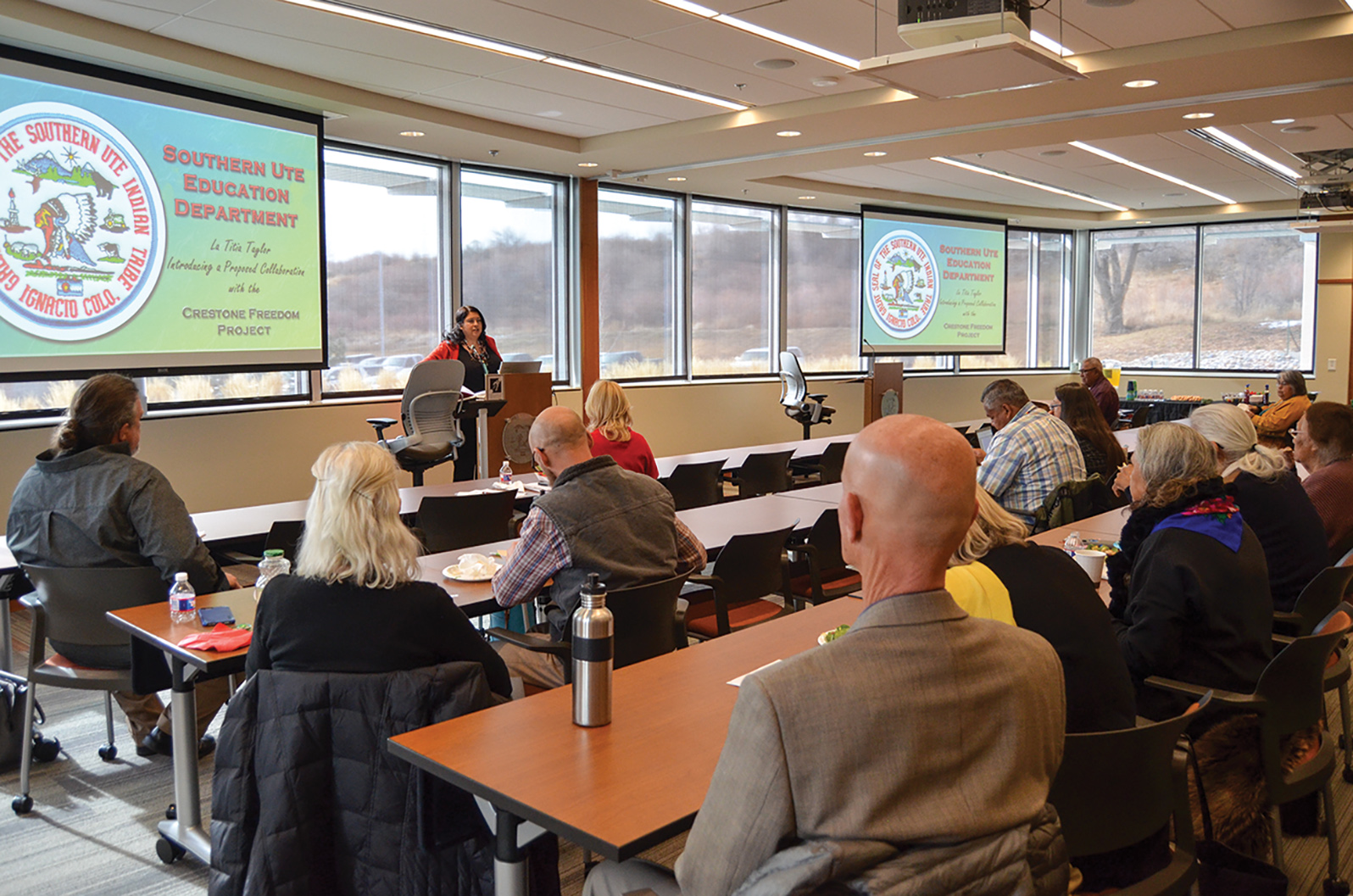The Southern Ute Education Department hosted a presentation about a possible collaboration between The Southern Ute Indian Tribe and the Crestone Freedom Project (CFP) on Wednesday, Dec. 11 at the Southern Ute Growth Fund building.
“When the kids are left out in schools, health, and programs like this; we are heading in the wrong direction as leaders,” Southern Ute tribal elder Erwin Taylor stated.
The Crestone Freedom Project is a non-profit organization located in Crestone, Colo. Their mission is to illuminate a path to freedom for adolescent youth who have been confronted by the effects and challenges of addiction by bringing hope where there is despair, unconditional love in place of alienation and total acceptance instead of judgment.
“I’ve seen a lot of mental health disorders that prevent our people from obtaining an education, a job, having a good healthy family life. How can we overcome these negative things in our lives?” asked LaTitia Taylor, Southern Ute Education Director for the Southern Ute Indian Tribe.
The Crestone Freedom Project offers a program called the Radical Freedom Project where there are three main principals: healing hearts, changing perceptions and revisioning lives. The residential program is broken up into these three phases, which are considered healing phases of the program.
The first principal – healing hearts, really focuses on understanding the role and commitment to healing and being willing to address wounds. The second principle focuses on mental health and how to perceive surrounding environments. The last principal is really about gaining insight into life and learning to live again and gain consciousness.
Within the three main principals, the basic program overview consists of six steps. Step one, The Therapeutic Community (TC) model which is an intensive and comprehensive treatment model that has been modified to successfully treat adolescents. TC is a treatment for addiction which originated in the 1950’s, which is now used to promote a holistic lifestyle and identify areas of change in their own behaviors.
Step two, the Cognitive Behavioral Therapy Protocol model uses Mindfulness-Bases Awareness Practices, which utilizes an application, stages of change, compassionate communication and relapse prevention principles.
Holistic therapies are incorporated to address diet, nutrition, education, physical fitness, such as yoga, stress reduction training and meditation. By using nature-based education and therapy, this portion of the therapy module addresses knowledge of nature and our coexistence within it.
Step five of the program overview is Career Development and Reintegration Resource. Part of this phase is the completion of high school diploma or GED, skills training and job placement though hands on training at vocational schools or college. The final step is CFP Proprietary and Adjunct Programs consisting of: love and acceptance, musical expression, trauma recall writing, vision journaling and community work programs.
“We recognize, and deliberately hold in conscious awareness, the truth that authentic, significant, and lasting change is possible, in fact, that change is inevitable through right understanding and right action,” wrote the Executive Director of Crestone Radical Freedom Program, Dewayne Vanderford. “We further affirm that recovery is only possible through deep healing, and healing must begin in the hidden place where our pain first took root, and that addictions and behavioral disorders of every variety are symptoms of the disease of emotional trauma.”
Two plans were presented at the Crestone Freedom Project presentation. Part of the proposed partnership could include purchasing a ranch property in Crestone, Colo., by providing a startup operating budget of $500,000. CFP would provide services that are agreed upon for $250.00 per resident, per day. CFP would expand their board from the current six to nine seats and fill those with approved Southern Ute tribal members.
“We talk about financial capital, for me it’s human capital. It’s very important that we grow our people and become a healthier community,” Southern Ute Education Director, LaTitia Taylor stated.

